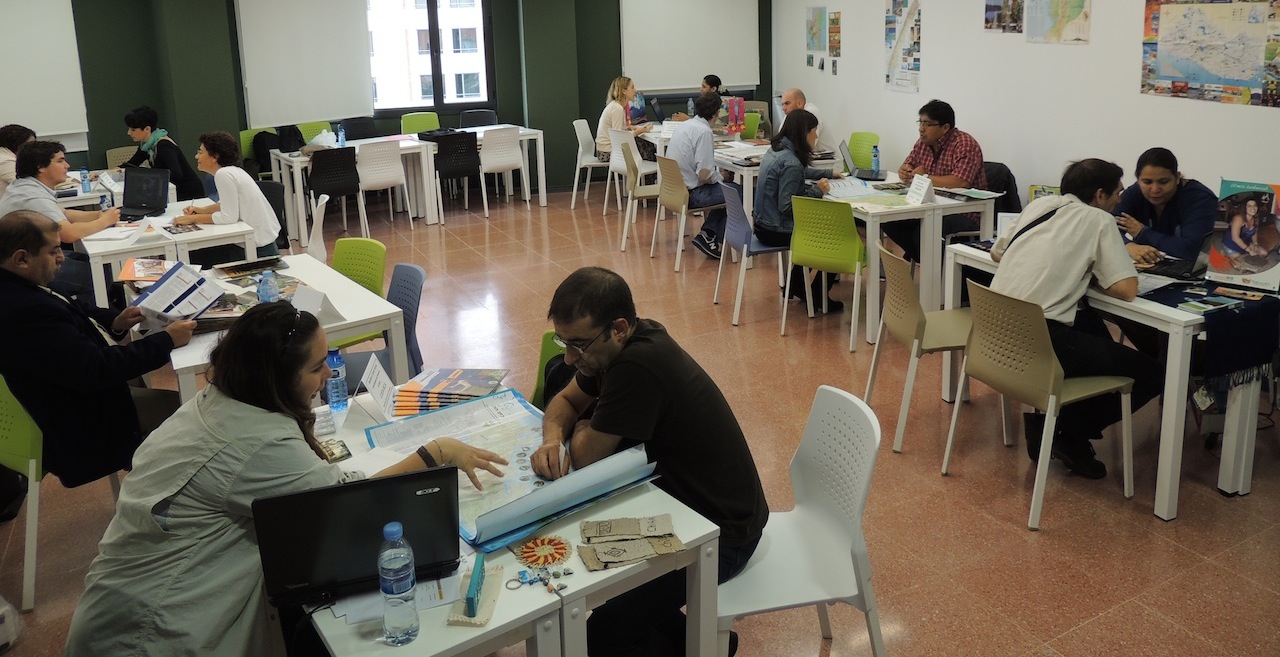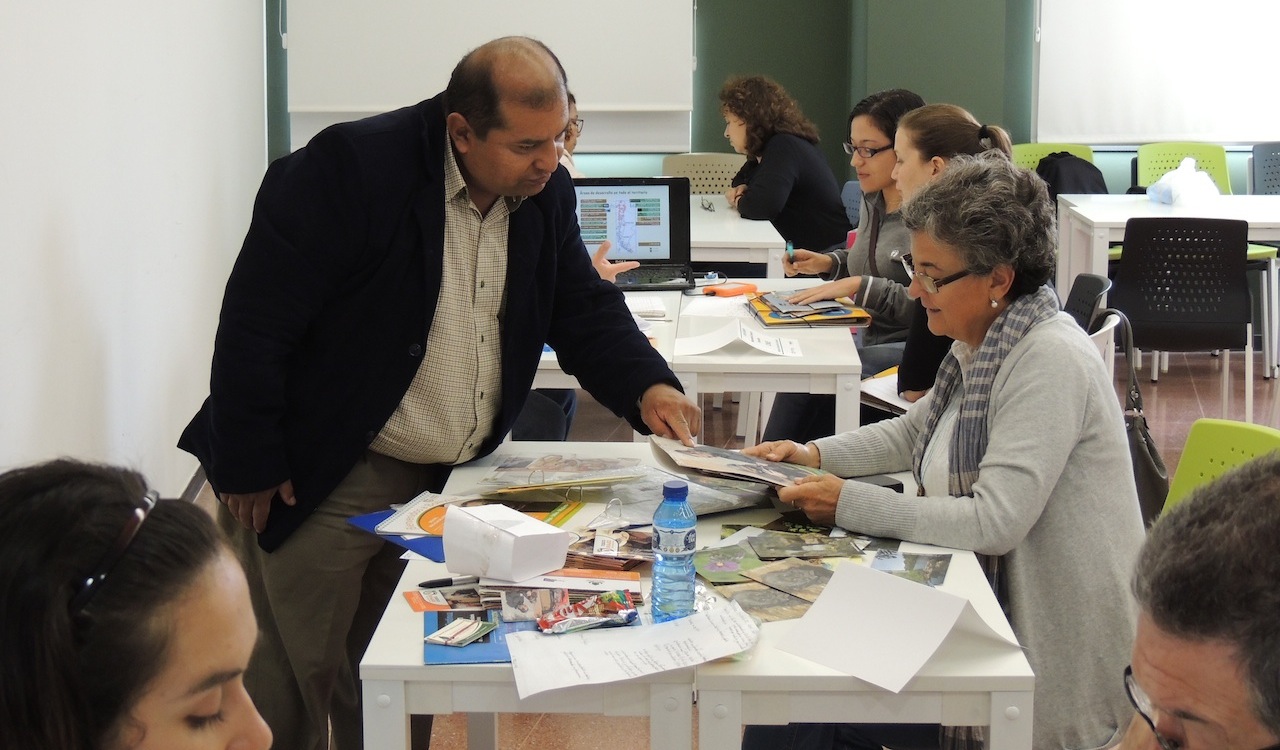11-11-2013
Rural Community-Based Tourism in Latin America Seeks Alliances in Catalonia
Ernest Cañada & Mariona Ortiz | Alba SudDuring October 20-29, 2013, a meeting sponsored by Alba Sud took place in Catalonia, bringing together representatives from eight community-based tour-operators from El Salvador, Nicaragua, Costa Rica, Brazil, Argentina, Chile, Ecuador and Bolivia.

Photography by: Madelyn Castro, from ACTUAR , during the Workshop of 10/25/2013. Photo by: Carles Arias (Alba Sud).
Titled "Marketing Rural Community-Based Tourism in Latin America," the initiative helped to promote the exchange of experiences and to strengthen commercial ties between Latin American rural community-based tourism operators and travel agencies in Catalonia [1] .
Marketing is Key
In recent years, many community-based initiatives have made significant efforts to improve their infrastructure and trained to carry out tourism activities, but the results have not always been successful. One of the major difficulties in these experiences has been getting a sufficient flow of visitors to financially compensate investments. Yet it is also true that there are many farmers´ and/or indigenous people´s organizations that are complementing and broadening their revenue through tourism, as shown by the representatives of the eight tour operators participating in the meeting that took place in the Casa de Cultura de Sant Cugat del Vallès on Monday, October 21, 2013.
There are communities and cooperatives that have managed to sell their offer directly to their local population and to foreigners who are visiting. In this sense, Flora Acevedo, professor of the School of Sustainable Tourism of the Autonomous University of Nicaragua (UNAN- Managua) and representative of the tour operator Exode-Nicaragua , insisted on not losing sight of the importance of the domestic market for the consolidation of rural community-based tourism (TRC, for its Spanish acronym), because "it is a clientele which is near, can visit throughout most of the year and can establish relationships of complicity with many initiatives, such as buying their products, in addition to tourism."

Overview of the Workshop held at CETT on 10/25/2013. Photo by Carles Aries (Alba Sud).
In other cases, peasant or indigenous communities have tried to reach agreements with tour operators or conventional agencies. It was not easy at first because many private companies generally disregard agreements with and ways of functioning of communities, or they do not understand the uniqueness of this offer or how to sell it to their customers. Logistical difficulties within some rural community-based tourism projects have also brought setbacks, such as difficult access or expensive costs. In any case, for the consolidation of marketing this type of community offering, it has been necessary to have either proper commercial structures or stable partnerships with trusted companies.
In some countries, coordination networks from various community initiatives have played a leading role in the implementation of new forms of marketing. This has been the case of the Tusoco Network of Bolivia, as explained by its coordinator, Sandro Saravia. In other countries, tourism’s daily management needs has led communities to create their own companies, with management autonomy and under the communitiy’s strategic control, as the company Runa Tupari of Ecuador, linked to the Cotacachi Union of Indigenous Peasant Organizations (UNORCAC, for its Spanish acronym). Christian Garzón, its manager, explained that "this division of structures, always under UNORCAC political control, had allowed them to grow and increase their sales volume." Another form of marketing has been set forth by some NGOs, who have assumed as part of their duties the marketing tasks of rural community-based tourism. Such is the case of Travolution in Chile, as recounted by its sales manager, José Gerstle . Finally, in other places, organized communities have been able to build partnerships with private companies with whom they have established trusted relationships that allowed them to work long term. This happens, for example, in El Salvador, where the family tour operator TouRuralES has partnered with the National Bureau of Rural Community-Based Tourism in this country and is responsible for organizing tourist circuits involving several initiatives, as explained by its owner, Roxana Flamenco.
Betting for community control
During the presentations of the different Latin American tour operators, it became clear that the concept of community-based tourism common to all experiences included as its fundamental pillars the will for community control of tourism activity, organized in different ways depending on the place, and the preservation of natural and cultural wealth. “Rural community-based tourism has helped communities have effective control over their territory and resources," stated Rosa Maria Martins, from the Brazilian TUCUM Network. "Many people had been forced to sell their land by pressure of big business and the difficulty of living with only one productive activity."
On the one hand, with rural community-based tourism initiatives, productive activities have been diversified and traditional revenue such as that related to agriculture, livestock, fisheries, handicrafts and forest management has been complemented by the additional tourism revenue. On the other hand, a growing model seeks to exploit resources while supposedly seeking sustainability and care for the environment. Madelyn Castro, representative of the Costa Rican organization ACTUAR, explained: "The rural community-based tourism projects arise from the need to find alternative ways to survive in conditions of poverty but are always a sideline to other daily activities. It is tourism which adapts to the environment and not the environment that changes due to tourism."
Furthermore, while populations have developed a stronger environmental awareness, they have also begun to develop more just alternatives to the current development model . Thus, "most projects reinvest profits to benefit the community and are strengthening the social fabric and human capital," explained Sandro Saravia of TUSOCO Network in Bolivia. The idea of increasing technical and political capacities is also present in many rural community-based tourism projects, as a way to increase the quality of the product offered but also as a way to educate the local population. This, coupled with the appreciation of their own culture, has led to an increase of individual and collective self-esteem. Especially relieving, is the impetus rural community-based tourism has given to improve the lives of women, "who are the primary support of this kind of projects and those who benefit the most," as Flora Acevedo argued.

Sandro Saravia of the TUSOCO Network of Bolivia during the Workshop of 10/25/2013. Photo by Carles Aries (Alba Sud).
One of the great attractions of this type of offer is that visitors can see the hand of the people who live and work in rural areas, their natural environments, the work they do daily, as well as different cultural expressions. They can also access unfrequented places, far from the traditional offer . Moreover, the tourists know that most of their expenses stay in the hands of the local population, and incomes are redistributed much more than in traditional offerings. This will to expand the number of people who benefit was explicitly made clear by Christian Garzón of Runa Tupari in Ecuador when he defended “that the bulk of tourists should not be concentrated in a few communities and homes, but rather have fewer tourists distributed to more places," in this way, facilitating economic diversification so that it does not become limited .
The need to clarify
During the conference in Sant Cugat, an audience member questioned whether there were too many similarities between these forms of tourism and solidarity actions, and if further clarification is needed. In this sense, it is true that some traditional European and North American NGOs have organized solidarity trips to meet and visit rural communities in Latin America, as a form of awareness and expression of commitment to these. Without denying their importance, or that of the various forms of volunteerism, which, among other things, have helped communities adapt to attending to visitors, meeting participants agreed that the construction of economic alternatives to help diversify incomes of rural families could not rely on such proposals, which are inevitably very mall. On the other hand, Roxana Flamenco, TourRuralES manager, said that "one cannot be permanently subjected to the solidarity of others." Therefore, if some communities adopt this economical route, they must not do it by selling poverty, but rather based on an interesting and attractive offer in itself. This option involves the challenge of building commercial structures that can generate real economic alternatives without communities loosing their capacity of control over the activity.
Notes:
[1] The initiative is part of a project managed by Amanecer Sur in partnership with the School of Tourism and Hospitality (CETT-UB) , Èxode Viatges, TOSCA, the City of Sant Cugat and the support of the Barcelona Provincial Council .
Article originally published in Catalan in the weekly Directa, no. 337, from 11/06/2013 to 11/12/2013.
Translated into English by Noelia Acosta (Alba Sud).
